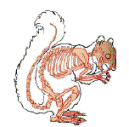
A wild thing with James Gandolfini's voice and Max Records in Where the Wild Things Are (dir. Spike Jonze, 2009).
J. Hoberman, in his Village Voice review, refers to Spike Jonze's Where the Wild Things Are as a group therapy session with muppets, and that's not inaccurate. For Hoberman this is a problem, but to my mind, Dave Eggers' script is the most engaging application of neurosis as an impressionistic medium since early Woody Allen. A word I might use to describe the film is "druggy," which is also usually an insult. But these are really weird, powerful drugs that leave the viewer--this viewer, anyway--in an emotionally complex state.
Sendak's book was never much on my personal canon; I always thought of it as slight and ponderous at the same time, too infused with what seemed to me like pop Jungianism and cheap primitivism--which is sort of impressive, considering that there can't be fifty words in the whole thing. But you know, it was just a kid's book, so no big deal. The pictures were pretty. Eggers' script, however, takes the dated psychological undertone of the text and turns it inside out, using the threadbare therapeutic allegory as satirically baroque wallpaper. The satire is never harsh or overly cynical, so the resultant tone is a poignant mixture of farce and elegy. Says Carol (James Gandolfini), walking with Max through a desert that symbolizes the sadness of a young person's first apprehensions of universal entropy, rocks turning to sand, and sand to dust, "I don't even know what comes after dust."
The weakest moments in the script are the two or three instances in which Sendak's words are pasted reverently into the dialogue (e.g., "Let the wild rumpus begin," or "I'll eat you up, I love you so." Other than this, the overall mood of sloppy beauty is immensely moving. A lovely film.



